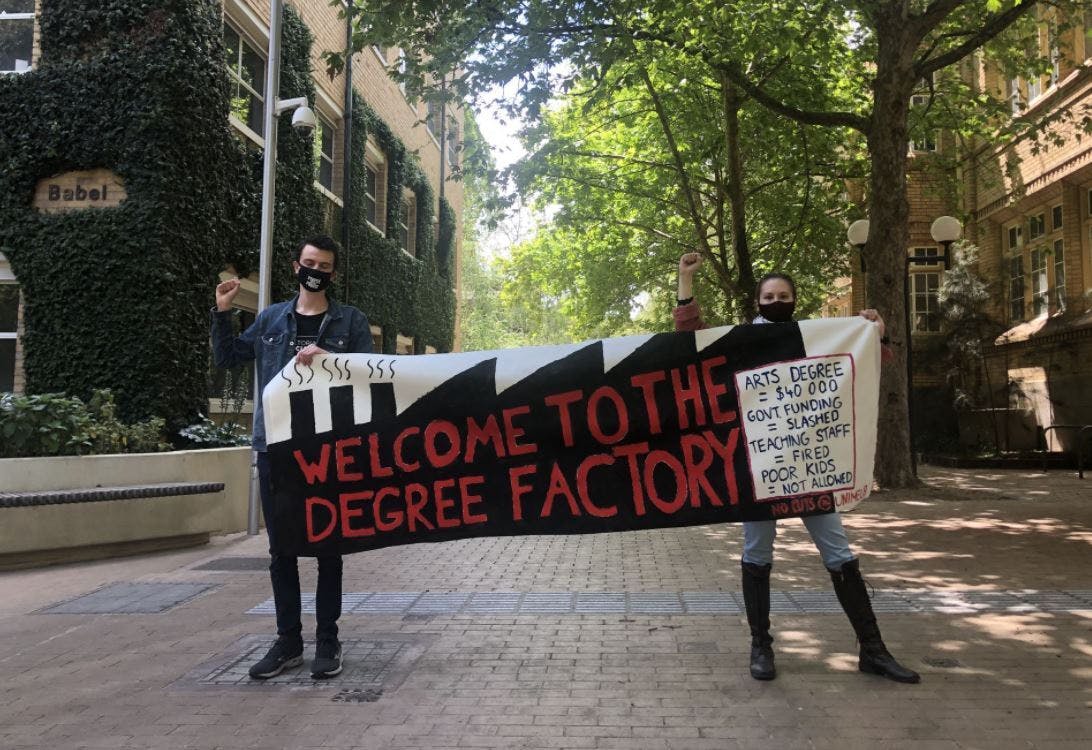Students have to resist attacks on universities. But how?

In early October, the Liberal government pushed through their “job-ready graduates package”. This “reform” is one the most significant attacks on higher education in Australian history.
It will double the cost of many degrees, and those fee increases will sit alongside a shocking 11% reduction in government funding per student on the standard Commonwealth funding support scheme. Alongside fees and funding cuts, this year’s legislation will punish students who fail units. They’ll be thrown off the HECS fee-deferment program.
The government’s ideology is clearly conveyed in the name of the policy. To them, it doesn’t matter if students receive an education; all that matters is that graduates are “job-ready” and can increase the profits of Australia’s bosses.
This neoliberal approach to education in Australia is nothing new. Since the Dawkins reforms introduced by the Labor government in the 1980s, universities have become increasingly corporatised. Since free education was abolished, both university fees and ancillary costs of receiving a university education have gone up and up.
Some amendments were introduced as the legislation was debated, but they don’t help ordinary students much. Pauline Hanson negotiated to include a discount for students who can pay their fees upfront. But few students can afford that. Discounts for up-front payments mostly help the wealthiest students, and creates more momentum toward an American style education system based on taking out private loans to fund your university enrolment.
And while the government drives attacks through its control of funding, campus administrations are pushing through huge cuts to courses and staff numbers. The University of Sydney is cutting its immunology degree–in the middle of a pandemic. At ANU, the physics department is being gutted. At La Trobe, over 3,000 staff have been cut. There are many more such cuts taking place around the country.
While university administrations are cutting costs and firing staff, the top executives rake in salaries in the hundreds of thousands of dollars. Melbourne University’s vice chancellor, Duncan Maskell, is one of the best paid vice chancellors in the world. Maskell seems to have a general interest in putting profits before human lives and dignity. He had the opportunity to air his worldview in an article in The Age, where he complained that too much attention is being given to “disease and mortality associated with this virus” and not enough to the “economic consequences” of life-saving decisions.
Throughout 2020, university students and staff have been organising to resist the new round of attacks from both the government and the university administrations. Students at major campuses have organised actions, both in-person and online, to defend higher education.
These protests have created some significant waves. In Sydney, students have had to defend their very right to protest, with some copping massive fines, while the city’s notoriously violent police have assaulted legal observers–breaking their phone that was recording their actions–and even arrested a law professor who was watching the protest take place. These protests have drawn in hundreds at the University of Sydney and many more at Macquarie and the University of New South Wales. In Melbourne, students took to the campuses as soon as the lockdown was eased, and they will be organising more actions into the future.
The bill has passed the senate, but there’s still space for students to resist these attacks. But it will take a confident, militant student movement on every campus that can force the administration to retreat and stop their assault on education. The government’s bill allows universities to increase fees, but that decision will ultimately be taken by the administration of each university. Whether they do so is not a foregone conclusion. Each campus is a potential site of resistance.
Socialist Alternative students on campuses around the country are organising campaigns that will pressure administrations to not pass on the fee increases. At the University of Sydney, the university senate will be meeting this semester. Students are planning to disrupt this gathering of senators, to show that students won’t stand for fee increases and course cuts. Actions like this should be replicated around the country.
At the University of Melbourne, we’re calling for the top administration to be sacked. We have no confidence in these administrations that for years have been cutting back on staff, reducing the number of courses available, and continue to squeeze students.
In the past students have defeated attacks like this. In 2014, a national campaign of student protests defeated attempts to deregulate higher education fees, which would have introduced $100,000 degrees. Already, some degrees and classes have been saved from the chopping block. Internationally, students in Chile and Quebec won free education through mass campaigns. When students fight boldly, they can win demands and defeat regressive governments and administrations. This fighting spirit is what we need going into 2021.
There is much to fight for. We need a student movement that can push against these attacks and present a different vision for higher education. We need an education system that doesn’t see students as cash cows or future building blocks of the economy. We want a fully funded, free education system that everyone has the right to access.